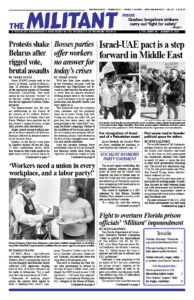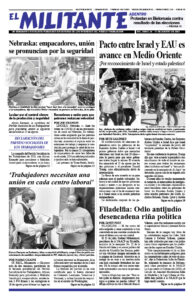CHICAGO — A sharp debate broke out here after Black Lives Matter Chicago, one of the many groups that has been involved in protests against police brutality, pointedly defended the organized looting of downtown businesses.
Working people awoke Monday, Aug. 10, to news reports of raised bridges and closed freeway exits into the Loop business and shopping district, and a sizable police deployment there, preventing many from getting to work.
Hundreds of people had caravanned to the area the night before, carrying out systematic looting, beginning at midnight and continuing into the early hours of the morning. It followed the cop shooting of 20-year-old Latrell Allen in the Englewood neighborhood the day before.
Despite earlier false rumors that the shooting victim was a teenager and had died, Allen was still alive, but badly wounded — shot four times in the back and once in the cheek. Cops claim he had a weapon and fired on them before they returned fire. His family insists Allen was unarmed.
Some Englewood residents gathered right after the shooting to protest. When dozens of cops were sent in response they jeered and chanted, “No justice, no peace!”
The looting was not a spontaneous expression of anger at police brutality. Social media posts show the looting was organized, with calls for people to converge on the Magnificent Mile shopping district at midnight.
Drivers arrived and waited while windows were smashed and stores looted. Sometimes they used the cars to batter open storefronts. Looters loaded up, then got back in the cars for a quick getaway. Others on foot with shopping bags of stolen goods were chased by cops. Police reportedly arrested more than 100 people.
That evening at a small protest organized by Black Lives Matter Chicago that applauded the looting, participants held a banner that read, “Our futures have been looted from us … Loot back.”
Ariel Atkins, a spokesperson for the group, said the thievery was part of “reparations,” which some liberals and middle-class radicals say should be given to Blacks as payment for what their ancestors were robbed of under slavery.
“I don’t care if somebody decides to loot a Gucci, or a Macy’s, or a Nike,” Atkins said, “because that makes sure that that person eats, that makes sure that that person has clothes, that makes sure that that person can make some kind of money because this city obviously doesn’t care about them.”
Workers say no to looting
That attitude doesn’t sit well with many workers.
Joyce Brown, Allen’s grandmother, told the Chicago Tribune she doesn’t trust the police version of the shooting, but “I don’t agree with the looting because that’s just an excuse to get what they want.” As she and other Englewood residents explain, the looting and protests have nothing to do with each other. Except that some individuals took advantage of the cop shooting to organize their “liberation” of property under cover of protest.
Socialist Workers Party candidate for U.S. Senate from Illinois, Naomi Craine, took issue with the defense of looting.
“It’s one thing to denounce the priorities of capitalist politicians who place the protection of property above human life,” Craine said in a statement Aug. 14. “But it’s another thing to characterize looting as ‘protesting,’ as if it were a legitimate method of struggle against any form of oppression or exploitation. Workers are not thieves.”
“Condoning, advocating, justifying or defending looting alienates working people, who in growing numbers across racial lines, in cities and towns large and small throughout the country, are speaking out against cop brutality. Many are joining in the fight to demand the arrest and prosecution of killer cops,” she said. “Looting is a blow to the movement against police brutality, making it more difficult to involve people awakened to the movement — Black, Latino and Caucasian.”
Those who defend the looting are oblivious to the loss of the livelihood of small proprietors and of workers at larger stores. This is no small question in the midst of the social crisis faced by working people today.
“It makes it easier for the cops to try and justify their brutality and to attack our sorely needed trade union and political rights,” Craine said. “The capitalist officials and media strive tirelessly to brand all struggles of workers and farmers as potentially violent and criminal.”
“To fight effectively against police violence and attacks on our rights, we need to organize broad, powerful and disciplined actions demanding the government arrest and prosecute the cops involved,” the SWP candidate said. “That will help us reach out to the trade unions, the churches, and the millions of workers and farmers, organized and unorganized, who can be drawn into the fight to push back the capitalist rulers and their cops.”

